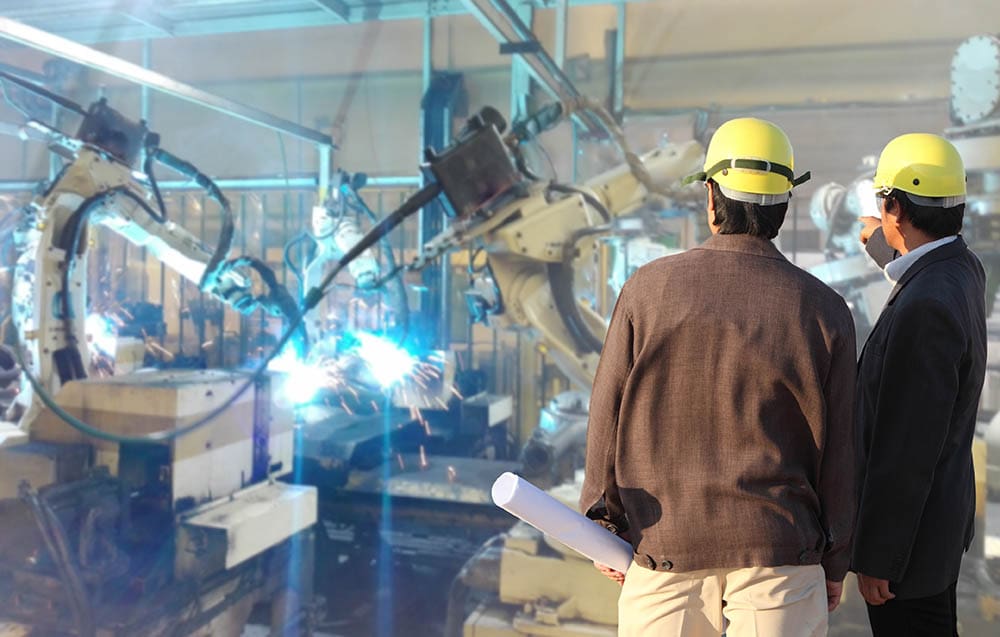How Much Do Welding Engineers Make? 2024 Salary Statistics
Last Updated on

Welding Engineers (also known as welding technicians) are in-demand career professionals. They contribute a great deal towards the efficient manufacturing of industrial products. It translates to a higher demand for welding engineers in many industrial sectors.
Earning a good income is something many welders desire. Becoming one of these success stories takes careful planning and execution. Many factors come in play in receiving handsome compensation. They include degree level, company, performance, and more.
In this post, we will explore more about this job and the salary you can expect to earn once you start working as a welding engineer.
What is a Welding Engineer?
A welding engineer can design, manufacture, and install different types of industrial machinery. They provide welding and cutting expertise to many manufacturing operations.
Welding engineers perform a variety of tasks. They include developing welding and cutting methods, equipment, and processes. In addition, they comprise welding-related systems.
Welding engineers install automated welding equipment. They also create and oversee welding procedures to ensure product quality. Welding engineers also weld metal components using manual and automated welding equipment.

Average Welding Engineer’s Salary
A welding engineer is paid to ensure that welding work is up to the highest standards, all of the engineering principles are in place in the construction, all safety standards are followed, and the environment is safe for employees.
On average, the annual salary is $80,000.
Below, we give you the breakdown of the earnings.
Hourly Wages
According to PayScale, a welding engineer makes about $40 an hour, on average. But there are welders even in the low $10 range.
Daily wages
The average salary of a welding engineer is $320 a day according to data from the US Bureau of Labor Statistics.
Weekly Wages
Usually, welding engineers work five days a week. Their average weekly salary is $1,598.
Monthly Earnings
A welding engineer’s monthly salary ranges from $6,000 to $7,000.
Annual Income
In a year, a welding engineer can make $83,116. The US Bureau of Labor Statistics collects this data.

Highest-Paying Cities for Welding Engineers in the United States
Welding engineers can get different wages, depending on the city they decide to work in. If you are thinking about a career as a welding engineer, it is crucial to know which cities have the best job salaries available.
We have put together a list of the top ten highest-paying cities for this occupation according to the US Bureau of Labor Statistics.
| CITY | AVERAGE ANNUAL SALARY | AVERAGE HOURLY SALARY |
| Bellevue (Washington) | $98,807 | $47.50 |
| Richmond (Virginia) | $101,700 | $48.89 |
| San Francisco (California) | $95,319 | $45.83 |
| Stamford (Connecticut) | $99,030 | $47.61 |
| Santa Clara (California) | $93,935 | $45.16 |
| Glendale (California) | $92,859 | $44.64 |
| Hartford (Connecticut) | $93,750 | $45.07 |
| Palmdale (California) | $94,292 | $45.33 |
| Lakes (Florida) | $95,342 | $45.84 |
| Pasadena (California) | $93,407 | $44.91 |
What Bonuses and Benefits Do Welding Engineers Receive?
Welding engineers work in various job settings, from small home-based operations to major factory settings. Many of them work long, irregular hours and have to travel often.
Welding engineers often enjoy good working relationships with other workers.
The bonuses and benefits that welding engineers receive differ. It depends on the size of the company they work for, the level of responsibility they have, and the industry. Usually, welding engineers go on vacations and have sick leave benefits.
Also, they receive health insurance, although it’s not mandatory. Welders often advance to supervisory or management positions. Job advancement opportunities depend on a company’s size. It also depends on whether the welder has professional certifications.
Skills Needed For a Welding Engineer
Skills in welding engineering serve as the basis of every successful welding engineer. You must know how to do welding. When working with metals, you need solid experience handling metal tools and machines.
Becoming a good welder is not something that you can do instantly. It needs long and hard practice. Practice makes you master the art. Here, we will discuss the duties of a welding engineer.
Conducting Research
A welding engineer researches and develops new and improved welding technologies. The engineer studies the properties of metals, such as their melting points, tensile strengths, and ductility. In addition, a welding engineer studies the properties of welding. They include heat resistance, weldability, and weld quality.
Managing Variables
Welding engineers study properties, such as heat input, output, and temperature of the weld pool. They must estimate the amounts of heat and time needed to produce a high-quality weld.
Additionally, they must understand that heat input affects weld properties, such as melting point and tensile strength. Besides, welding engineers must also understand that heat output affects the heating and cooling rate of the weld pool.
Sometimes, welding engineers estimate how much heat is lost in the weld pool. The loss of heat decreases the temperature of the weld pool. It, in turn, lessens the welding quality of the weld.
Outlining Plans
A good welder will outline a plan, including a list of materials, tools, equipment, and safety precautions. The plan includes a list of steps.
The welding engineer must know how much material is required, the amount of equipment they need, and how large the area to be covered is. If the job has extra steps such as cutting and grinding, the welding engineer must outline them also.
A welding engineer must include a schedule when to start, finish, and clean up. The welder must consider the time required for travel, setting up shop, and loading and unloading.
Directing Laboratory
A successful welding engineer must have the ability and skill to direct the laboratory work. They should have a thorough knowledge of the laboratory procedures, as applied to welding.
Additionally, a welding engineer must analyze and interpret the laboratory findings. They should also correlate the findings to the metallic materials from which the welds are made. A welding engineer should observe the welding process at the laboratory and the production site.
A welding engineer’s fields of specialization include:
- Aerospace
- Transportation
- Electronics
- Machinery
- Construction
- Hydrospace
- Power generation
How Do You Become a Welding Engineer?
Have a Bachelor’s Degree
You need a Bachelor’s degree in engineering, mathematics, or physics to become a welding engineer. Some employers may require a master’s degree or additional training as well.
A bachelor’s degree in engineering requires four years of study. You will take many of the same courses as engineering students. However, you will focus more on welding engineering.
Attend a Graduate School
After earning a bachelor’s degree, you should attend graduate school. You will study welding engineering or welding engineering technology. The goal of graduate school is to teach welding principles. In addition, it will equip you with the tools needed to continue welding after graduation.
Apply as an Entry-Level Welding Engineer
Usually, entry-level welding engineer jobs begin with an engineering apprenticeship. As an apprentice, you will work with and learn from experienced welding engineers. You can continue working as a welding engineer. Alternatively, you may ask for the opportunity to design, prototype, or test welding equipment.
Obtain a License
As a welding engineer, you must hold a state license that authorizes you to work as an engineer. The requirements for this license vary from state to state. But they usually include passing a test that covers the basic principles of welding and metallurgy. Some states require applicants to pass a licensing exam.
Have a Certificate in Specialized Welding Techniques
To become a welding engineer, you need to have at least one specialized certificate from an accredited school. The certificate should indicate that you have completed at least three years of study.
Some schools have special programs in welding engineering. These programs usually require four years of study.
Conclusion
These days, there are so many employment opportunities in the welding engineering industry. There are scores of renowned companies that need experienced welding engineers. These engineers maintain their fleet of heavy equipment to prevent accidents.
Welding engineers are compensated for this work. Perhaps you are thinking about becoming a welding engineer. If so, you should know what to expect from this profession in terms of salary, employment, and other crucial facts that we have discussed above.
Featured Image Credit: MNBB Studio, Shutterstock
